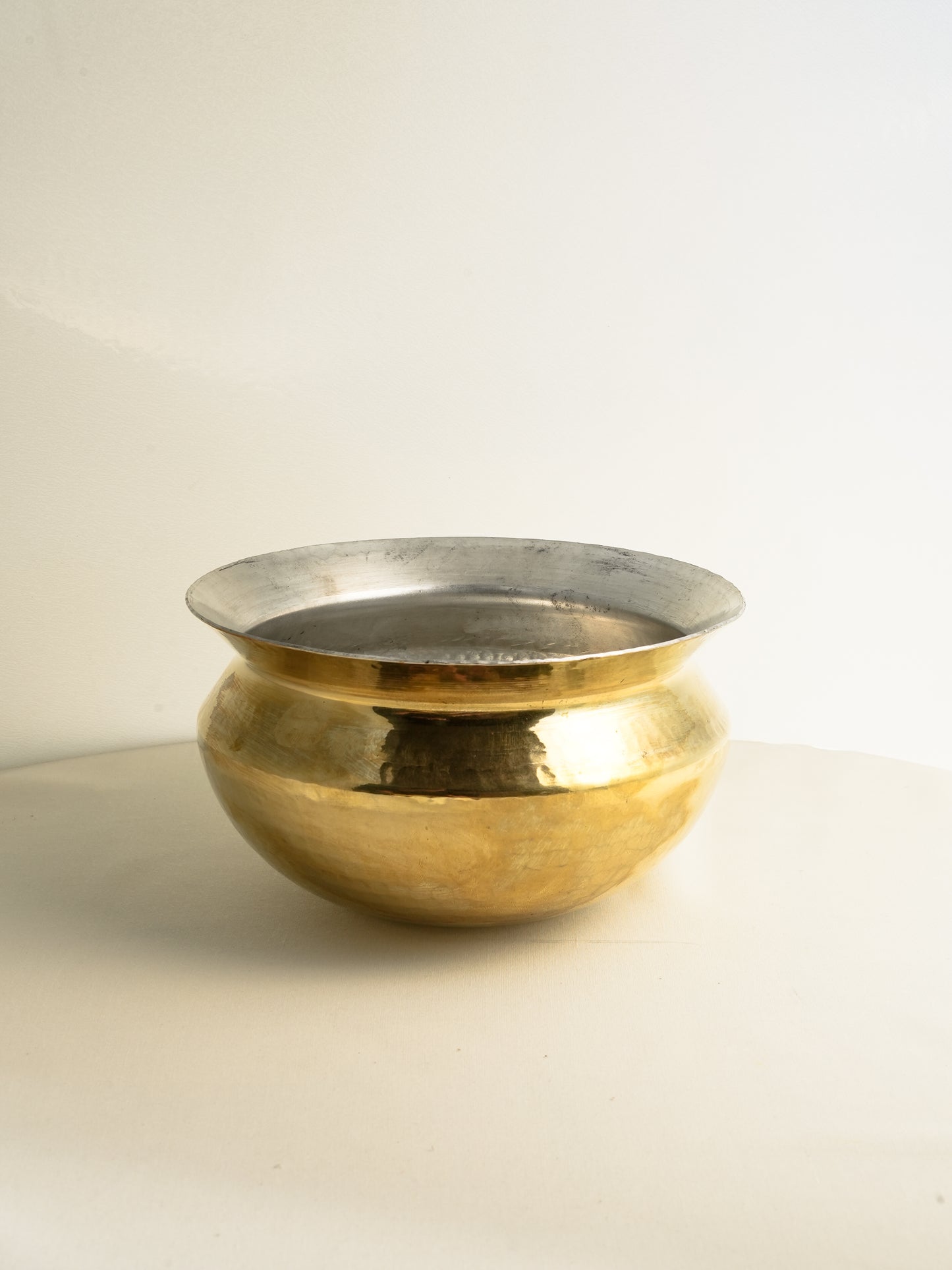BRASS SIPRI
BRASS SIPRI
A small traditional brass pot used in pooja rituals or to store holy water. Simple, timeless, and auspicious.
Couldn't load pickup availability
Product Description
Product Description
Net Quantity - 1N
Your order contains - 1 pc Handi
Height in cm :
1.5L: 11.5
3L: 14
Diameter in cm :
1.5L: 18.5
3L: 24
Finish: Plain Golden ( Handcrafted in pure Brass) Tin coated (silver color) on the inside
Weight in kg:
1.5L: 0.95
3L: 1.55
Note: Any variation in weight and size is characteristic of handcrafted products.
Usage and Benefits
Usage and Benefits
Usage & Historical Context
The brass sipri is a deep, tin-lined vessel traditionally used across Gujarati, Rajasthani, and South Indian households for boiling milk, making prasad (like sheera or lapsi), and slow-cooking ritual foods. Known for its rounded base and tall sides, it was a staple in temple kitchens and family homes, often resting over low flame stoves to prepare ghee-laden, sattvic recipes. Its depth helped prevent spills while boiling, and the tin lining made it safe for dairy and mildly acidic ingredients. In many homes, sipris were reserved for sacred cooking—like heating milk during pujas or preparing foods for bhog and naivedya.
Benefits
The brass sipri offers even heat distribution, preventing hotspots or scorching. Its tin lining ensures safe use with milk, jaggery, or light acids. The deep design is ideal for boiling, steaming, or slow-cooking festive dishes. It’s a preferred vessel in sattvic and ritual cooking, maintaining purity and tradition. Handcrafted by artisans, each piece is unique and long-lasting, developing a beautiful patina over time. Whether used daily or during festivals, the sipri becomes a cherished part of your kitchen—bridging generations through slow, nourishing food preparation.
Clean and Care
Clean and Care
Brass products naturally oxidize and develop patina over time. With proper care, they retain their beauty and functionality for generations.
Daily Use Care
Wipe dry after use: After contact with water or food, gently dry with a soft cloth to avoid stains or spots.
Keep away from harsh chemicals: Avoid dishwashers, bleach, or abrasive soaps.
Use dry materials: If using for dry snacks, pooja samagri, or spices, ensure the brass is moisture-free.
Weekly or Occasional Cleaning
1. Natural Cleaning (Homemade Polish)
Lemon & Salt: Cut a lemon, sprinkle salt, rub gently, rinse and dry. Removes tarnish and revives shine.
Tamarind or Vinegar: Soak for a few minutes, rinse thoroughly and wipe dry.
Besan & Curd: A traditional method—mix gram flour and curd, apply as a scrub, then rinse off.
2. Pitambari Powder (Recommended for Brass)
Apply a small amount of Pitambari powder with a damp cloth or sponge.
Rub gently in circular motions to clean and restore luster.
Rinse thoroughly with water and dry completely.
Use gloves if you have sensitive skin.
Note: Pitambari is specifically designed for brass, copper, and bronze – safe, effective, and quick.
Tin-Lined Brass Care (e.g., Sipri, Handi, Kadhai)
Wash gently with mild soap and soft sponge—avoid lemon or salt on inner tin lining.
Re-tin (kalai) every 6–12 months if the lining wears out for safe food use.
Avoid acidic ingredients like tomato or tamarind if the lining is worn.
Storage Tips
Store in a dry place to prevent tarnish.
Wrap items in soft cloth or muslin if not used regularly.
For pooja brassware, store separately from kitchenware.
Share
- Free shipping
 Easy 7 days Exchange
Easy 7 days Exchange
 faster delivery
faster delivery
- 100% Pure
- packaged
- Genunine




